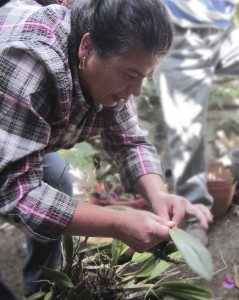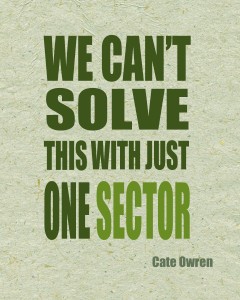Innovation: The Power of Gender Equality in Environmental Sustainability
By Sara Gendel, MS ‘15
Climate change affects everyone, even though the stakes are unequal across societal groups such as region, class, and gender. This inequality creates unsustainable economies, societies, political structures, and environmental management, especially for those living in developing countries.

Though mitigating climate change has been on the global policy agenda for decades, it has only within the last 10 years opened the doors for gender role considerations in decision-making processes. Why is that important? Well, women in particular are strongly impacted by social crises since it is suggested that about 70% of the worlds poorest people are women.
Activists and educators have brought this unequal gap to the attention of policy makers globally in order to include women in climate change decisions.
Gender equality and environmental sustainability advocate Cate Owren spoke with Bard Center for Environmental Policy as part of our National Climate Seminar series. Working as the Senior Policy Advisor in the Global Gender Office at the International Union for Conservation of Nature, she argues that women’s rights, political participation, organization, networking, civil society participation, and access in global policy are keys to advancing goals of protecting society from climate change and gender inequality.
Why are Gender Role Considerations Necessary for Climate Policies?

In a large part of the world, women have less access to physical, financial, human, social, and natural assets that would improve resilience to crisis. Access would enhance security, particularly in land, credit, agriculture, information sources, technology, and training services. In particular, Owren explained that women use 98% of subsistence agriculture in Africa; however, women own only 2% of land. If women had the same access to productive resources they could increase yield on a farm by 20-30%, which could raise total agriculture output in developing countries by 2.5-4%! That could reduce world hunger by 12-17%.
For basic water needs for a family, Owren stated that women in rural areas of Africa spend an average of 2 to 9 hours per day collecting water. These women haul about 100 liters of water per day, which is equivalent to around 220 pounds! Since women spend a great deal of time and energy collecting this basic necessity, other needs are not met (such as education, health and healthcare, and income opportunities).
When a natural disaster hits, more women than men die when gender inequality is present in the society. The London School of Economics studied disasters that occurred in 141 countries across a period of time and found a direct link between women’s economic and social rights to mortality.
Additionally, other development goals—such as climate change resiliency—are impacted.
What Can Societies Do?
Societies play a major role in climate change. It is important that they foster participation of equal leadership of men and women. Data indicates that the outcomes of equal participation create more egalitarian, democratic, and sustainable leadership. In addition equitable decision-making reflects more fully the needs and capacities of a whole population. For example, Owren described a study of 130 countries that revealed in those with higher percentage of women representatives, the government was more likely to ratify environmental treaties and set aside protected land areas.

It is important to foster gender equality—this includes men, too. Men have to be engaged and brought in as partners. Understanding societal norms such as women’s work and time burden for basic needs opens up the opportunity to reduce this burden, aiding in education, better health and healthcare. With understanding and a bit of access to information, policies can be reframed to positively impact gender equality.
The take home point Cate Owren eloquently stated, “We can’t solve this with just one sector.”

